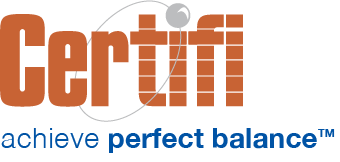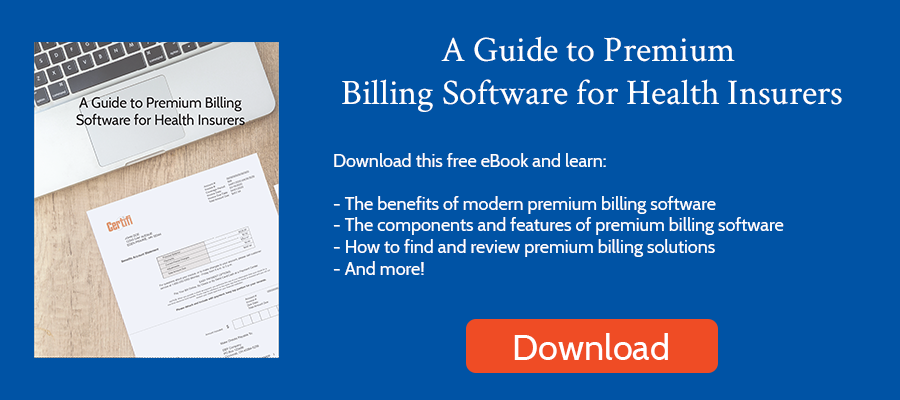Inaccurate billing practices can negatively impact a health plan’s brand and bottom line. Plus, correcting those mistakes wastes time and inflates call center call volume. Ensuring accurate health plan premium billing should be a strategic priority.
But doing so can be difficult. Some health plans use inflexible legacy billing systems. Many use multiple premium billing systems resulting from past mergers and acquisitions. Others use their core administration’s billing module. The vendor rarely updates that module, and the software usually lacks functionality like integrated delinquency management or a payment portal. That results in more call center calls and a poor member experience.
Background: The Health Plan Premium Billing Process
The premium billing process includes a number of steps and involves several business units. Typically member data, rate calculation rules, and billing rules drive invoice values. That data may reside in several health plan systems and needs to be combined to generate an invoice. Periodically, usually monthly, bills are generated and delivered to members and groups by mail or email. Those invoices may also be available within the member or payment portal.
Members then make payments by autopay, by mailing a check, or by making an online payment with a card or via ACH. The health plan may also distribute delinquency communications to members who fail to make a payment by the due date.
Insurers typically leverage a billing application that has either been internally developed, purchased as part of another application like a core administration software solution or enrollment platform, or as a standalone, modular billing application like Certifi.
That software impacts several business units within a health plan. The billing team serves as the day-to-day users of the software, leveraging it to manage the billing process. The technology team often maintains the software solution and may even lead premium billing software procurement efforts. The member services team uses the software to look up member data when supporting members.
With that background, here are a few best practices for accurate health plan premium billing:
Establishing Data Integrity
Poor data integrity leads to inaccurate billing. Health plans can improve billing accuracy by improving data integrity. Here are three common data integrity errors we consistently see in health plan billing:
System Design
Premium billing technology platforms built around accounting principles consistently outperform those that aren’t. What does that mean? It means that for every credit, a corresponding matched debit exists to force balance. Adjusting that credit results in a corresponding adjustment to the matched debit.
Your technology system design also extends to automating manual processes. For example, integrating and automating delinquency communications improves delinquency notification accuracy by eliminating manual delinquency generation. Not only does that save time, but it leads to a better health insurance member experience.
Locking Invoices
Premium billing may involve retroactive adjustments or other modifications to a monthly premium. Some billing departments manually modify billing data after sending a premium billing invoice. That manual adjustment can lead to inaccurate payments and inaccurate future invoices.
Instead, locking invoices to eliminate modifications – coupled with an accounting technology design – improves the accuracy of each invoice. Disallowing data changes after an invoice has been generated and released improves billing accuracy.
Automating Retroactivity
Those retroactive adjustments should also be automated by your technology when possible. Instead of manually applying a retroactive adjustment, consider software that automatically calculates and creates adjustments based on timelined change data. Automating those retroactive adjustments improves the accuracy of adjusted invoices while increasing member satisfaction.
Continuous Improvement
Improving the accuracy of health plan premium billing isn’t a one-time occurrence. Instead, it’s a process that occurs over time. Here are some tips for continuous improvement in your premium billing process:
Conduct Regular Internal Training Sessions
A well-educated premium billing team can also improve billing accuracy by adhering to policies and processes designed to improve accuracy. Organize regular training sessions for the billing team to address specific topics, such as software updates and process standards. Internal subject matter experts with expertise in health plan billing can lead these sessions.
Provide Cross-Training Opportunities
Cross-training employees on different aspects of the premium billing process can enhance their skills and create a more versatile and efficient team. Encourage billing managers to identify opportunities for cross-training within the department, allowing team members to learn from each other and gain a broader understanding of the billing process.
Regular Performance Reviews
Conduct regular performance reviews for billing team members to assess their strengths, areas for improvement and training needs. Use these reviews to provide constructive feedback and identify specific training or development plans to address skill gaps.
Identifying Opportunities for Premium Billing Process Improvement
First, ensure you have a culture of continuous improvement. Encourage a culture of improvement within the premium billing team. To do that, regularly seek feedback from team members, analyze billing processes for inefficiencies, and implement improvement initiatives. Encourage open communication and collaboration to foster an environment where team members feel comfortable sharing their process improvement ideas. Also, create a culture that isn’t afraid to admit mistakes. Teach the team why they happened and how to avoid them.
Then, identify manual processes that lead to billing errors or take an inordinate amount of time. For example, determining where to apply unidentified check payments can be time-consuming and lead to inaccurate payment applications. A child may send their elderly parents’ Medicare Advantage payment on a single check. It may take billing personnel a long time to determine where to apply that check, or they mail fail to associate the payment to the correct account.
Artificial intelligence improves health insurance processes, including this one. For example, we leverage machine learning to scan the check details and search the billing system for the appropriate account. The machine learning then suggests how to apply the check. The user makes the ultimate decision, and the AI learns from that choice, improving its ability to make the correct decision over time. By integrating machine learning into the process, we can improve the accuracy of that decision while saving time.
Monitoring Key Performance Indicators to Measure Billing Accuracy and Effectiveness
One way to gauge your billing accuracy is by using metrics to understand your billing accuracy over time. Though the data you can access drives your chosen metrics, health plans often measure inaccurate premium bills by inbound customer calls to your call center. Track how many calls your call center answers that result from inaccurate premium invoices. That’s usually as easy as adding a category to your call-tracking software if you’re not already tracking it.
As for other metrics, we recently wrote about six premium billing dashboard metrics here: Six Must-Have Premium Billing Dashboard Metrics.
Ensuring accurate health plan premium billing is essential for maintaining a positive brand image, reducing call center volume, and improving the member experience. By implementing best practices such as establishing data integrity, leveraging system design principles, automating retroactive adjustments, and fostering a culture of continuous improvement, health plans can enhance the accuracy and efficiency of their premium billing processes. Ongoing staff training and development, identifying opportunities for process improvement, and monitoring key performance indicators help promote continuous improvement. By prioritizing accuracy and employing these strategies, health plan billing managers can contribute to the success of their organizations and deliver optimal outcomes for members.
Certifi’s health insurance premium billing and payment solutions help healthcare payers improve member satisfaction while reducing administrative costs.



